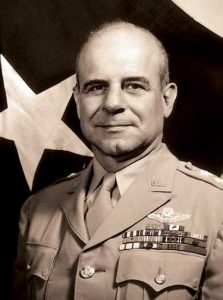Winner of the Spring 2017 StMU History Media Awards for
Best Article in the Category of “People”
On January 30, 1933, Adolf Hitler was appointed Chancellor of Germany. Hitler quickly turned Germany’s fragile Weimar democracy into a one-party dictatorship. During his rule, Hitler pursued a plan to harass one half-million German Jews to leave Germany. Hitler promoted a “master race” scheme that sought to keep the so-called Aryan race pure from racial contamination from all other races he deemed to be inferior. This Aryan race consisted of only Germanic peoples who had the characteristics of blond hair, blue eyes, and light colored skin. Three years after taking power, Hitler hosted the 1936 Olympics in the German capital of Berlin. This was his opportunity to put his “New Germany” on display for all the world to see.

As Hitler’s Nazi government prepared for these Olympics, athletes from the United States were also preparing themselves for the coming competition in Berlin. In the United States, African Americans were dealing with their own problems of racism. Not only was life hard as an African American in the 1930s, but life was even harder as an African American athlete. One African American, who would later become one of the most famous athletes in the history of Track and Field, was James Cleveland “Jesse” Owens. At the age of eight, he had moved to Cleveland, Ohio with his family, who had sought for better work and educational opportunities. “On his first day of school, he introduced himself as ‘J. C.,’ but his teacher misunderstood him to say “Jesse.” The young Owens bashfully accepted the mistake, thus taking on the name by which he would become famous.”1 Jesse Owens would grow up loving to run. He was the fastest runner in his school and loved competing against others. His dream was to attend the University of Michigan, but there were no scholarships offered in those days and his parents could not afford tuition. Instead, he attended Ohio State University, where he worked for the boosters to pay for his expenses.
In the Summer of 1936, at the Olympic trials, Jesse finished first in all three of the events that he competed in. He had trained hard in the preceding months, and the hard training paid off, allowing Owens to attend the Olympics of 1936, known as “The Nazi Games” or as “Hitler’s Games.” In actuality, these Olympic games were not originally intended to be games hosted by the Nazis: the “Nazis were never invited to host the Games—and probably never would have applied to do so. Instead, the International Olympic Committee (IOC) had awarded the Olympics to Germany’s Weimar Republic in 1931 before the Nazi takeover as a way of welcoming Germany back to sports respectability.”2

Ironically, Adolf Hitler knew nothing about sports and expressed little interest in hosting the Olympics; instead he wished to host an all-German athletic celebration. “But Dr. Josef Goebbels, the influential minister of propaganda, glimpsed how Germany might score a tremendous public-relations coup and convinced Hitler to support both the Winter and Summer Games.”3 Influenced by Dr. Josef Goebbels, Hitler used these Olympic games as a political relation with other countries.
Several weeks after the Olympic trials, Jesse Owens competed in the Berlin Olympics and made a name for himself. He won four gold medals, in the 100m, 200m, 4x100m relays, and in the long jump. Jesse Owens had set records and represented America in a humble and most respectable way, considering the circumstances. Even though many have claimed that Adolf Hitler refused to congratulate Jesse Owens, others go further by claiming that Hitler actually “snubbed” Owens:
By the end of that fabulous week in Berlin, an attractive yarn attached itself to the name of Jesse Owens. Supposedly, he was ‘snubbed’ by Adolf Hitler, who reportedly refused to congratulate him publicly after his victories. Actually, the story was concocted by American sportswriters, who were all too willing to read the worst of motives into Hitler’s behavior and to assume innocent excellence from America’s newest hero. Although it had no basis in fact, the story of ‘Hitler’s snub’ was repeated so often that people took it as truth. It remains one of the great anecdotes of American popular culture.4

Racism was as alive in the United States as it was overseas in Germany in the 1930s. German Jews were a persecuted minority in the 1930s, and African Americans were experiencing similar treatments of racism in 1930s America. “World reaction to Hitler’s program resulted in a movement to boycott Nazi goods and services, which included a movement to take away the 1936 Olympics from Berlin in an attempt to force the German government to cease its discriminatory practice against the Jews.”5 It was not until the United States entered World War II that sentiment against racism began to penetrate the American social consciousness. Even though Owens continued to face white racism in his own country subsequent to his Olympic victories, he later reflected on his experiences of racism: “What I’ve done is no more than countless other Negros (and Jews, Poles, Greeks and just Americans in general) have done…. I’ve been a Negro in America for fifty-seven years, and I want to tell you that [being black in America] can be pure hell at times and can shake anyone’s sureness. Often it’s worse if you were the world’s fastest human.”6 When Owens returned to the United States after the Olympics, President Franklin Delano Roosevelt refused to acknowledge his accomplishments or even invite him into the White House. It was not until 1979 that President Jimmy Carter presented Jesse Owens with the Living Legend Award. Forty-three years after his Olympic victories, Jesse Owens had finally been properly recognized for his great achievements.
Despite all the controversy that Jesse Owens encountered while doing what he loved, he is a true representation of perseverance and determination. Jesse Owens passed away in March of 1980 from lung cancer.
- Salem Press Biography Encyclopedia, January 2017, s.v. “Jesse Owens,” by William J. Baker. ↵
- John Rodden and John P. Rossi, “Berlin Stories,” Commonweal 143, no. 13 (August 12, 2016): 25. ↵
- John Rodden and John P. Rossi, “Berlin Stories,” Commonweal 143, no. 13 (August 12, 2016): 26. ↵
- Salem Press Biography Encyclopedia, January 2017, s.v. “Jesse Owens,” by William J. Baker. ↵
- D. A. Kass, “The Issue of Racism at the 1936 Olympics,” Journal of Sports History, no. 3 (1976): 223. ↵
- Joseph Boskin, “Jesse Owens: Running in the American Dilemma,” Review in American History, no. 3 (1987): 457. ↵



161 comments
Maggie Amador
This article was very well researched and I had never before considered Hitler’s influence on Jesse Owens’ career. Jesse Owens is incredible and amazing for continuing to do what he loves despite the prejudice and racism he faced. I am glad that he received recognition for his achievements before his death, although it was undoubtedly late. Jesse Owens fought a fight that many were too afraid to face and for this, he truly is a legend.
Lyzette Flores
Reading this article made me really upset because Jesse Owens worked really hard for his achievements to not be congratulated by the president at the time just because he was a man of color. I am really glad to hear that President Jimmy Carter stepped up and awarded him “The Living Legend Award.” He was indeed a legend and always will be remembered that way.
Alyssa Garza
This article is well written and very interesting to read. I’m happy that Jesse Owens had so many accomplishments but not that he had to wait to be recognized for them. Even though his skin tone was different he took a stand even when he was scare of racism and he continued to run and break records in the process. Owens had this courage inside of him to keep going and to get the recognize that he deserved so much.
Pedro Gonzalez Aboyte
This is a well-written article that highlights important points in Jesse Owens’ life. It is fascinating to see how a man who faced racism in his own country still won medals for them and showed pride for being who he was and where he came from. It was a lot of pressure for him because he had to deal with racism in America and also in Nazi Germany! He never gave in and always strived to be the best and he accomplished his goals.
Roman Olivera
It’s crazy to think that possibly the greatest American Athlete in the 1930’s was just ignore by the President of the Untied States, Franklin D. Roosevelt, upon his return from the Germany Olympics. Jesse Owens was the real man who broke the color barrier is sports. He competed in a time where he would has been hated in other countries as well as in his own. What a sad time in history to see such racism and bigotry around the world. It was great to hear he finally got recognized by President Jimmy Carter, 43 years after his victories in the Olympics. What a great article this was, Mr.Owens was truly a brave man in a time where just being born who he was, could have got him rejected by soo many.
Montserrat Moreno Ramirez
It is an amazing article, and it’s crystal clear that racism is not a thing of one country or one place. It’s unbelievable how in spite of his great skills and medals he won for his country he still felt like being a person of color could be “hell” sometimes. Jesse Owens is a person to look up to, to admire and use as an example that if you work for something hard enough you can accomplish your goals.
Mason Meza
Jesse Owens is a very iconic figure. All the constant battles he went through while racing is the reason he became so popular. He was bullied on and off of the race track, and when he went to the Olympics in Berlin is where he faced racism the hardest. This article did a very good job on explaining the battles that Owens had to over come to be the iconic figure that he is today.
Donte Joseph
What an amazing article to highlight the trials Jesse Owens faced on and off the track. By facing his competitors and his social injustices, Jesse Owens truly did have a lot on his plate and must have been overwhelmed by the stress. To have to courage and perseverance to continue to compete and maintain a humble attitude is an amazing feat in itself and is a lesson that many would benefit from learning.
Dylan Sanchez
Such a well written article about the great Jesse Owens. I couldn’t imagine the pressure of being a black athlete back then in the USA alone, but in Nazi Germany? That sounds heated. I loved hearing of his upbringing from childhood and knowing how he was a hard worker to stay in school. He was a well rounded person, God bless him.
Avery Looney
This story is very well researched and written. Jesse Owens had to compete with more than just the other competitors on the track. No matter where he went he was constantly fighting a battle against racism. It is good to hear that even though he did not get the recognition for his achievements as soon as he should have, he eventually got it. Owens is a hero and his name will never be forgotten.